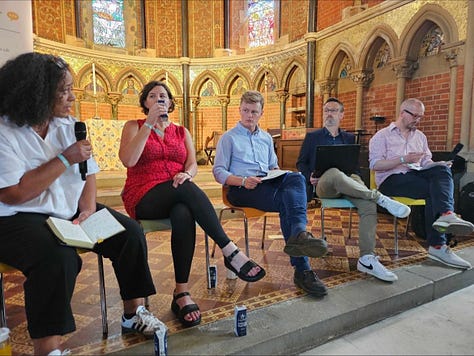Sunday thoughts: New Ministers, DfE job roles, MPs educational backgrounds, and the Festival of Education

In case you’ve been living under a rock, the biggest news is the election. When the full DfE and DSIT teams are announced I may have a further take on if this signals anything different, but at the moment the policy challenges are the same as they’ve been long identified either in Labour’s manifesto, or in the issues they’re deliberately ducking, both of which I’ve spoken to the media about a bit recently – how to invest in education in the absence of growth, how to recruit 6,500 teachers, how long Ofsted reform will take and will it get stuck in the weeds, what to do about university finances, whether Skills England is a thing and not just a giant quango and so on. Who gets picked as Ministers will be key to making big plans happen.
At time of writing, other than Bridget Phillipson and Peter Kyle formally being confirmed in their briefs as the two SoS, the junior Ministers first appointed into the two Departments are the newly ennobled Jacqui Smith and Patrick Vallance. Vallance needs little introduction; he’s been lauded on a cross party basis including from his predecessor George Freeman; and dismissed by anti vaxxers, which is also a helpful sense check that a sensible appointment has been made. Smith is a great appointment – she knows the DfE from her previous time as a Minister of State covering schools and 14-19 under Ruth Kelly; she used to represent a reasonably heavy student-y seat in Redditch in the West Midlands that sent people to Worcester, Birmingham, Coventry and Warwick among others; and she’s familiar with international students and migration from her time as Home Secretary. Also, she knows how to dance from Strictly, which is bound to come in useful at some point. It’s hard lines on Matt Western who has held the Shadow brief for a long time, but them’s the breaks.
Also, for someone that wants to abolish the House of Lords, Starmer is already realising that it’s a great way to get some experts into the Government (see also: Lord Timpson)……
Much debate about a job ad posted by DfE a couple of days ago, for six “senior strategy advisers” to help deliver on the new government’s opportunity mission – salary £53k to £57k. Reaction on Twitter ranged from the salary being too high, to it being far too low.
Full disclosure – I know Amy, the hiring manager, well, and these are brilliant roles that I hope she gets loads of applications for (and I am sure she will). Part of the issue, though, is that the job advert doesn’t really reflect the actual seniority of the role.
These are Grade 7 roles in the Department – which is the first level up once civil servants are out of the fast stream. The typical starting Grade 7 will normally be 24 to 25 years old (obviously there can be far older ones, but I’m thinking of a typical transition for a 21 year old fast streamer after 3-4 years).
Don’t get me wrong – they’re really important, Grade 7s are in many ways the engine room of the Department, and Strategy Unit does do some of the most interesting work in the Department, and normally hires older and more experienced and senior staff. But when the job ad says things like:
Support the Secretary of State to set and maintain strategic direction, lead on priority strategy projects and join up activity across the department.
Undertake short, incisive projects on behalf of the Secretary of State to support teams to develop new policy.
Support the Department to engage with the most forward-thinking and experienced voices in the sector, ensuring our strategy and policies are evidence-based and future-focused.
Set the strategic environment the department works in across major policy, parliamentary and fiscal events
….it is not really true that these roles do that – or at least, a Grade 7 will not be on their own “undertaking projects on behalf of the Secretary of State” or “setting the strategic environment for the department”. And the postholders will be “supporting the Secretary of State”, but only in the way that all civil servants do.
I do understand why the civil service ramps job ads up to the max. Ironically, it’s at least partly in lieu of being able to offer high salaries. And in fairness, this ad is a lot clearer than many other government ones I’ve seen, and does speak deliberately to people who want to come in from outside government - all of which is to DfE and Strategy Unit’s credit.
But the difficulty is that, although this job ad is better than many, and fairly easy to parse for those who understand government, and can therefore decode both what language does and doesn’t mean, and what Grades do and don’t mean, it is (self evidently, from the last couple of days), still a bit unclear whether it’s right for these roles to be paid far more than most teachers and almost as much as a primary headteacher, or whether its’s ridiculously low for roles which seem to be some of the senior most strategic advisers on a major government priority.
Jordan Urban of the Institute for Government wrote about this recently, and it struck home to me:
Too often, civil service job adverts are inaccessible to people outside government. They are often filled with jargon and assume the civil service’s grade structure is self-evident, failing to clearly explain the level of responsibility a job entails. They don’t explain who candidates will work with and what they will learn as a result, nor do they frame the civil service as a talent-dense environment. Some roles are still only advertised on GOV.UK.
This discourages people from applying to the civil service. As one interviewee put it in an Institute for Government report: “The job advert lost me, so I lost interest in the job.” It also reduces the quality of those who do apply. Another interviewee for that report, who is part of the senior leadership team at a UK start-up valued at more than $500m, described how in his organisation: “we explicitly market ourselves to prospective employees as a highly talent-dense environment; we find that the higher we make the quality bar, the more attractive we are to the most talented people.”
On the one hand, Jordan’s call for government to frame jobs as being in “talent dense” environments is evident in this job ad. On the other hand, “civil service job adverts are inaccessible to people outside government. They are often filled with jargon and assume the civil service’s grade structure is self-evident, failing to clearly explain the level of responsibility a job entails.” – yep, yep, yep, yep.
The Sutton Trust did the latest in their brilliant series of analysis at the end of the week showing the educational background of the incoming government, with the headline finding that this is the most comprehensively educated Cabinet ever, and much more closely reflects the country. It got so much cut through that it was asked as a question to the PM in his first press conference held yesterday morning!
The only bit that I slightly take issue with is the university base of MPs and the Cabinet. Sutton Trust are completely right to say why school base matters – because MPs need a wide range of experiences; because they legislate on state education; and perhaps most importantly, because students to state schools are more or less randomly allocated (not totally, because parents express preferences, plus they move into catchments etc), you’d expect a reasonably wide range of school backgrounds from a system for selecting MPs which selects largely on talent and aptitude.
But universities are slightly different. Firstly, because they actively stratify on intake based on cognitive ability (as measured by A Level or equivalent results), and because they have a signalling effect on exit. So you’d expect people coming out as graduates to not be evenly distributed in terms of progression after university. For some students, university is what makes it possible for them to become MPs. As Sutton Trust rightly say, “For some of today’s newly elected MPs, attending a highly selective institution will likely have been a major enabler in their own social mobility story, and it is perhaps not surprising that many MPs are highly educated.”
But also, even within every tariff group, universities have different strengths and areas of interest, which at least some students self select into. Oxford and Cambridge, and some Russell Group institutions, are more political than the median university. So the median student who is interested in politics, especially party politics, may well choose a university that is known for having a track record in this space. Similarly, if someone is interested in student politics and activism, then some universities are known for having a base for this. It’s not just a fluke that Oxford has educated every graduate English Prime Minister since 1937 (again, drawing on Sutton Trust analysis here). It’s that at least in part, it is the atmosphere and experiences and opportunities of Oxford that both attracts, and shapes, student politicians and those who go onto professional politics. It was the case for the last set of Conservative Cabinet Ministers, and it’s the case for at least some of the incoming Labour Cabinet (including Phillipson).
So whilst I couldn’t agree more with the Sutton Trust that we want a wide funnel for prospective politicians, I don’t think especially that university background is a major issue – as Isabel Hardman wrote a few years back, there’s a lot of bigger issues which need to be addressed.
The most fun thing last week wasn’t however the election, but was the Public First Education Election Debates held all day on Thursday at the Wellington Festival of Education. We had five really well attended sessions, thanks entirely to the high quality speakers we were delighted to host. Also, the best venue at Wellington in the glorious Chapel. Many thanks to the team at Ed Fest for asking us to put on the strand – we’ll be back next year!






